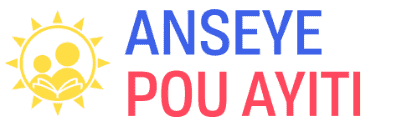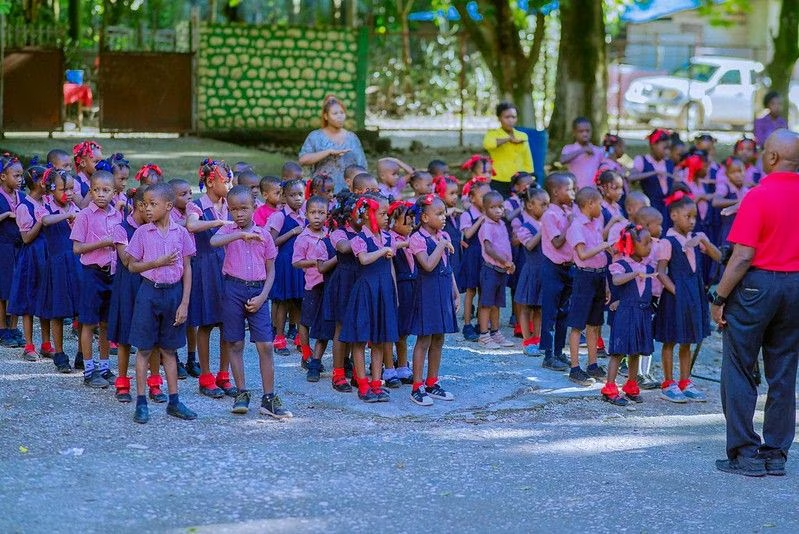This systemic issue manifests through the language of instruction, outdated teaching methods, lack of civics education, and the persistence of corporal punishment. Anseye Pou Ayiti (APA) is at the forefront of addressing these issues, advocating for a transformative approach that prioritizes cultural relevance, critical thinking, and the holistic development of Haiti’s youth.
The Language Barrier: French vs. Haitian Kreyòl
One of the most significant barriers in Haiti’s education system is the use of French as the primary language of instruction. While only a small fraction of Haitians speak French fluently, the majority speak Haitian Kreyòl. This language disconnect not only impedes comprehension and literacy but also alienates students from their cultural roots, leading to an unstable sense of identity.
At APA, classrooms use Haitian Kreyòl for lessons and assessments, aligning education with students' linguistic and cultural realities. APA’s initiatives extend beyond the classroom, creating a wealth of Kreyòl-language resources including learning tools, reading materials, videos, radio programs, and writing competitions. This approach not only helps to make education accessible and relevant, but actively works to enrich the cultural landscape of Haiti, helping to stabilize and enhance Haitian identity.
Rote Memorization vs. Critical Thinking
Traditional Haitian education heavily relies on rote memorization, stifling students' creativity and critical thinking skills. This method prevents students from truly understanding and retaining information and hampers students' ability to solve problems independently. Haiti’s future depends on a generation that can think creatively and critically to address the country’s challenges.
APA champions a pedagogical approach that emphasizes creativity and critical thinking, equipping students to be the bearers of Haiti’s future. Through innovative teaching methods and interactive learning environments, APA is nurturing a generation of thinkers and leaders who can drive Haiti forward.
The Absence of Civics Education
Civics education is crucial for nurturing informed and engaged citizens. The removal of civics education from the curriculum poses a significant risk to students’ understanding of their rights and responsibilities as Haitians. This gap in education leaves students without the knowledge necessary to participate fully in their communities and in national life.
APA integrates civics education into its programs, emphasizing the importance of civic responsibility and national pride. By doing so, APA encourages them to engage in community and nation-building activities. This education instills a love of country and a sense of civic duty in students, preparing them to be engaged and responsible citizens.
Corporal Punishment: A Harmful Legacy
Despite being criminalized in 1843, corporal punishment remains a common disciplinary method in Haitian schools. This practice inflicts physical and psychological harm on students, causing them to withdraw. This is counterproductive to their growth and development into responsible leaders.
APA’s focus on healing-informed pedagogy advocates for the eradication of corporal punishment. This helps civic leaders understand and address the traumas that have been inflicted by an oppressive educational system. Fellowship graduates lead community campaigns against this practice, promoting nurturing and supportive disciplinary methods. By prioritizing the well-being of students, APA helps cultivate a generation of confident and accountable leaders. This approach helps to reclaim the power of education to heal and transform, creating a just system for the next generation.
Reclaiming Power and Restoring Identity
Haiti’s education system has long been a vehicle for de-humanization and de-Haitianization APA’s mission is to transform the Haitian education system into one that honors and nurtures Haitian identity. Its mission goes beyond addressing the symptoms of a flawed education system; it aims to transform the system itself. Through APA’s initiatives, the dehumanizing elements of Haiti’s education system are being dismantled.
By focusing on nurturing and protecting youth, APA is equipping civic leaders – many of whom have experienced the very systems they seek to change – to reclaim their power and create just, supportive environments for the next generation. This approach supports the holistic development of Haiti’s youth.
As APA celebrates its tenth anniversary, it’s clear that these efforts are making a significant impact. APA’s work is a testament to the power of community-driven solutions and the importance of culturally relevant education in creating a brighter future for Haiti. APA remains dedicated to fostering a generation of Haitians who are proud of their heritage, equipped with the skills to succeed, and committed to building a just and thriving society.
Through collective action and a commitment to culturally relevant and compassionate education, there is hope that Haiti can overcome its colonial legacy and build an education system that truly serves its people. APA is making a profound impact on the lives of Haitian students and the broader community. The journey is ongoing, but the progress made so far offers a promising glimpse into a future where education serves as a powerful tool for liberation and national pride.

